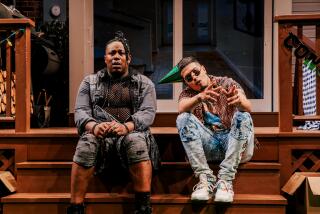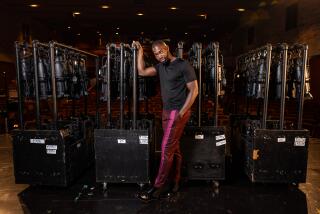Brooklyn as a metaphor
Herb Gardner urged me to go back.
The author of the plays “I’m Not Rappaport” and “Conversations With My Father,” who died last year at age 68 after a tenacious struggle with emphysema, was my friend. A couple of years ago, he and I were having one of our marathon phone conversations, he at home on the Upper East Side, I in my office in New Haven, Conn., when I confided in him the difficulty I was having in starting a new play. I was in my mid-40s, coming down from the headiness of the biggest success of my career and suffering from a severe case of “Now what?”
“I love your Brooklyn plays,” he said. “Why don’t you go back to Brooklyn?”
“I don’t want to go back to Brooklyn,” I told him. “It took me years to get out of Brooklyn, why would I want to go back now?”
“Because you’ve never looked at it from this point in your life before.”
Herb was right. I had tilled the soil of my Brooklyn-Jewish upbringing in a succession of semiautobiographical plays written during the ‘70s and ‘80s but had consciously steered clear of Brooklyn ever since. Retrospectively, there is a Bildungsroman progression to these plays: “Found a Peanut” (1984), set in the concrete backyard of a Brooklyn apartment building on the last day of the summer of 1962, was a snapshot of childhood; “The Loman Family Picnic” (1989) centered on a nouveau-middle-class Brooklyn family’s tragicomically desperate handling of its firstborn son’s bar mitzvah; and “What’s Wrong With This Picture?” (1985), in which an adolescent reeling from his mother’s sudden death is confronted by the dead woman herself, who has come back on the last night of shiva to clean their Flatbush apartment.
While the focus of my 1991 play “Sight Unseen” was no longer on a Jewish son but on a mature Jewish artist, and the drama was set mostly in England, it still had a foot -- and, arguably, its heart -- in Brooklyn. The play served effectively as a bridge between the provincial Brooklyn of my youth and the outside world; it also proved to be the career breakthrough that enriched my life in many ways, not the least of which was that it provided the catalyst for my friendship with Herb Gardner.
Shortly after “Sight Unseen” premiered in New York at Manhattan Theatre Club in 1992 (it originated the previous year at South Coast Repertory), I was invited to write a piece for the New York Times. The essay, “A Playwright’s Search for the Spiritual Father” (which ran on Father’s Day), was a rumination on fathers and mentors, creativity and influence. In it, I described the seminal experience, at age 8, of seeing my first Broadway play. The play that had me utterly transfixed was “A Thousand Clowns”; the playwright was Herb Gardner.
A few days after the article ran, I received a note from a man I’d never met: “What, here it is Sunday and you don’t give your spiritual father a call?” The writer of the note, of course, was Herb, and, fatefully, he included his telephone number. I called him, we met, and I quickly acquired a new old friend, one with whom I would commiserate, kvetch and laugh, over meals and, as his disease progressed, increasingly over the phone, for the next decade.
A borough’s glory days
I can’t muse about Brooklyn without thinking about Herb. We were both Brooklyn boys, although he was nearly a generation older; Herb’s Brooklyn was my parents’ Brooklyn. Theirs was the real thing, the Brooklyn of legend, not the faded, ghostly place where baby boomers like me grew up.
My parents met at a block party in Flatbush on V-J Day. Their wartime courtship took on an iconic quality in my imagination, as if they were stars of their own Warner Brothers picture, set to a Big Band score.
My fantasy was fed by movies of that era that mythologized Brooklyn and made archetypes of its people, all of them blunt, unpretentious, salt-of-the-earth, who spoke a kind of roughhewn poetry. War movies always seemed to include lovable, vaguely Jewish GIs who hailed from or were even called “Brooklyn” and who would no doubt be dead by the final reel. Family photos from the ‘40s pictured preternaturally mature bobby-soxers with lipstick and cigarettes, seemingly all of them resembling Olivia de Havilland or Linda Darnell.
To have come of age in Eisenhower-era, baby-boomer Brooklyn was to feel cheated of the glory days. The Dodgers had already moved west. Ebbets Field was leveled and replaced with a high-rise housing project. Steeplechase Park in Coney Island shut its doors when I was 10; I was there exactly once, shortly before it closed, and still recall my one exhilarating spin down its burnished mahogany slide.
By the late ‘60s, public school education, which had served me and my fellow boomers so well for a time, was no longer a panacea for upwardly mobile middle-class kids. The families of those kids moved upward -- or outward -- to the suburban promise of Long Island and sent once-solid Brooklyn neighborhoods spiraling downward.
Once urban flight took hold, the last vestiges of my parents’ Brooklyn vanished. Streets and subways were no longer safe. The Sheepshead movie theater was converted into a roller-skating rink; the Elm Theatre became a bank. Ebinger’s Bakery, famous for its chocolate blackout cakes, went out of business and Dubrow’s Cafeteria, best known for its kasha varnishkas, closed its revolving doors.
If I long for Brooklyn it is not so much for the geographical place where I spent my childhood but for an ethos that was already dead or dying by the time I was old enough to realize that something was amiss. When I look back at Brooklyn now, from the vantage point of the middle of my life, I find that it is a place that no longer exists, indeed one that may never have truly existed in my lifetime. Maybe it’s because I no longer have a familial connection to the place; my parents are long gone and my brother has moved to L.A. Maybe it’s a feeling I’ve always had. I was nostalgic for my parents’ and Herb Gardner’s Brooklyn ever since I was a boy.
Perpetual self-consciousness
When I was growing up in Sheepshead Bay and Coney Island in the ‘50s and ‘60s, the Brooklyn Bridge took on for me almost mystical significance. That exquisite span was the gateway to a gleaming city where the future was bound to be more exciting than that which lay ahead in Brooklyn. In my young, television-addled mind, the New York skyline had merged with that of the Emerald City, a magical notion fed by repeated annual viewings of “The Wizard of Oz.” Manhattan was a place rendered in vivid Technicolor while Brooklyn’s hue was not even black-and-white but drab sepia.
Perhaps it is the omnipresence of that majestic bridge and those shimmering skyscrapers that contributes to the Brooklynite’s perpetual state of self-consciousness, for those landmarks are constant reminders of his marginal place in the world. The Brooklynite lives on the periphery, tantalizingly within reach of Something Else, Something Greater, lying just across the river. It is precisely that condition that shapes personalities, fuels ambitions, and creates in some an overwhelming sense of restlessness and yearning.
Brooklyn is the metaphoric home to anyone who has ever seen himself as an outsider, who has ever been torn between the powerful, atavistic tug toward the traditional and familiar and the magnetic allure of the unknown.
Brooklyn is the past recorded in faded Super 8. It is innocence, childhood, family, community, a safe place. Brooklyn is Rosebud, Camelot, Atlantis. It is the state of grace that exists solely in memory or fantasy. Brooklyn is the precious thing we’ve lost.
So when my friend called me back to Brooklyn that day on the phone, I followed, with all the queasy curiosity of a prodigal son looking homeward. I knew the terrain well but hadn’t walked it as a man in midlife. Scenes began to lay themselves out; I started to get a sense of the landscape of a new play. It would not be a sentimental journey bathed in nostalgia, but a fresh exploration of old themes, clear-eyed and present tense. If “Sight Unseen” was a play about leaving Brooklyn, then “Brooklyn Boy” would be one about looking back.
Ten years ago, on the emotional-roller-coaster night “What’s Wrong With This Picture?” opened on Broadway, as the actors took their curtain call, two huge hands grasped my shoulders in triumph. It was Herb, seated in the row behind me. How fitting that the man who was largely responsible for my early infatuation with theater should be present on the night of my Broadway debut, literally right behind me, cheering me on. In a sense, Herb, the uber Brooklyn boy, was there all along.
“Brooklyn Boy” is for him.
*
Donald Margulies’ plays include “Sight Unseen,” “Collected Stories,” “The Model Apartment” and “Dinner With Friends,” for which he won the 2000 Pulitzer Prize in Drama.
More to Read
The biggest entertainment stories
Get our big stories about Hollywood, film, television, music, arts, culture and more right in your inbox as soon as they publish.
You may occasionally receive promotional content from the Los Angeles Times.






